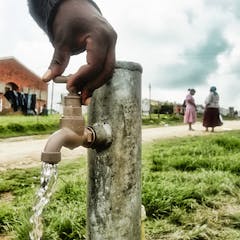
Articles on Informal settlements
Displaying 1 - 20 of 52 articles

Protests in Kenya reveal that a young, enlightened, urban population can drive a hard bargain with a state that is failing them.

In response to flooding that destroyed homes and displaced thousands in Nairobi’s informal settlements, the government has been evicting people living in riparian areas.

Youth migration, unemployment, proliferation of small arms and drugs are some of the drivers of violent crimes in Lagos.

Most of the 1 billion people in informal settlements are in the tropics where the threat of humid heat is rising. Poor weather station coverage that misses local hotspots puts them even more at risk.

The impact of housing quality extends beyond health to education and subsequent economic outcomes, particularly for children.

Climate change is putting pressure on Ethiopia’s largest city, Addis Ababa, and exposing people to disease and natural disasters.

The goal of a ‘slum-free India’ would benefit residents of informal settlements more if the housing being built drew on the features of their old neighbourhoods that made their lives better.

Cholera has persisted longer in Africa largely due to worsening hygiene and sanitation situations in urban areas.

The study highlights the flimsy boundaries between different forms of violence: torture and extrajudicial punishment, lawful arrest, and an unlawful kidnapping.

Women and girls living in poverty face many forms of discrimination and pressure during events like flood disasters.

The UN estimates one in four city dwellers live without access to basic services or adequate housing.

Addis may be shaping up to look like the modern city that the government wants, but it is yet to meet the needs of most residents.

Fetching water entails physical hardship that can often lead to mental agony and can sometimes even threaten a woman’s safety.

Despite environmental education topics in curricula, not all children are aware of the elements that endanger the planet or actively involved in taking care of the environment.

Trevor Ngwane, an activist and academic, shows how structures that emerged in the struggle against apartheid continue in democratic South Africa, now in conflict with the ruling ANC.

Much of the commentary on the July riots, which cost over 300 lives and billions of rands in damage to the economy, has neglected the long history of violent protests in the country.

CC BY-NC-ND8.54 MB (download)
More needs to be done to support South Africa's township communities.

Africa’s urban challenges are increasingly well known and documented. But the amount of data produced on urban Africa still pales in comparison to other parts of the world.

Nairobi harbours all the ingredients for zoonotic spillover to occur between animals and people, particularly in the most densely populated areas of the city.

The COVID-19 pandemic risks reversing progress made to increase access to affordable, reliable and sustainable domestic energy sources in Kenya.





